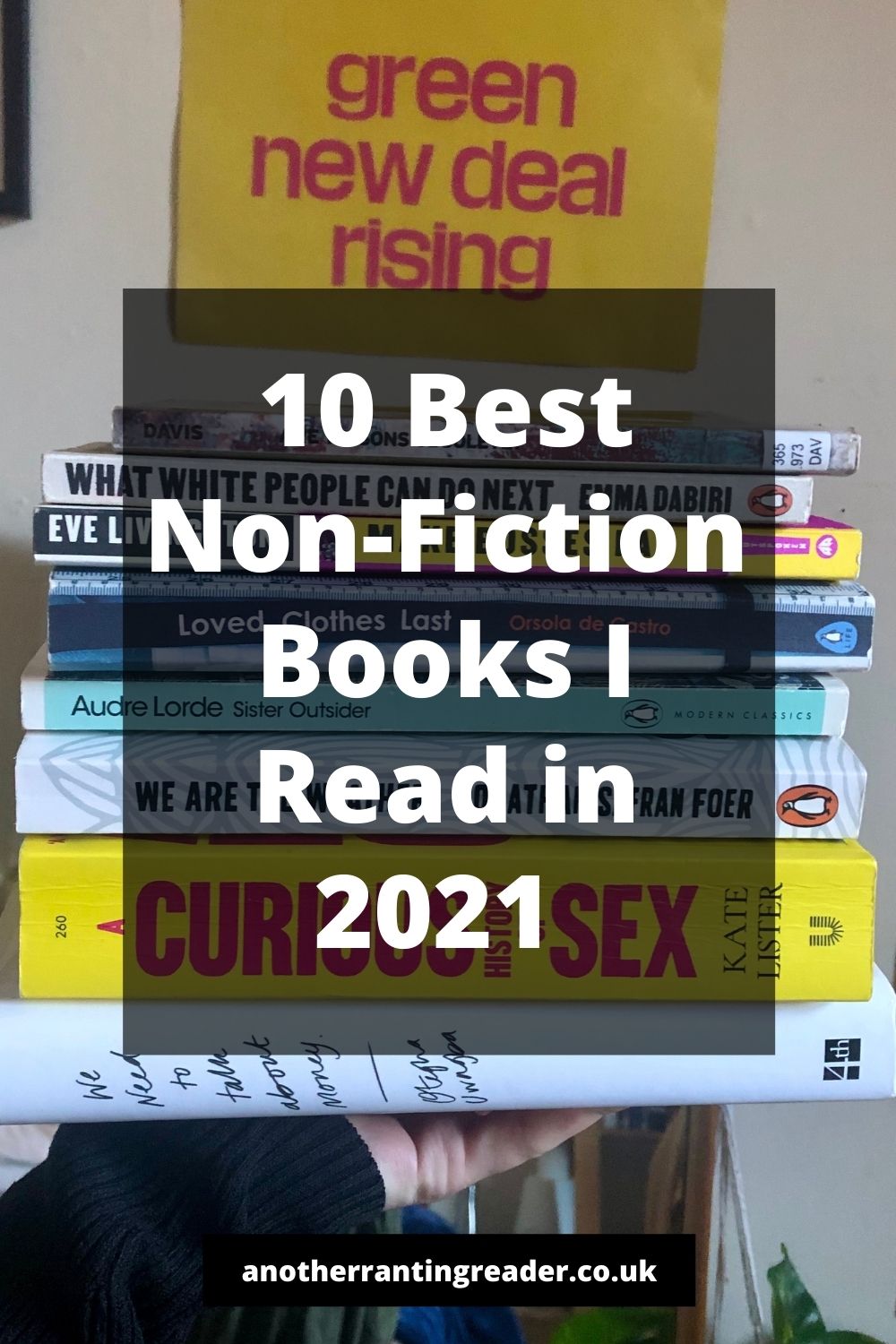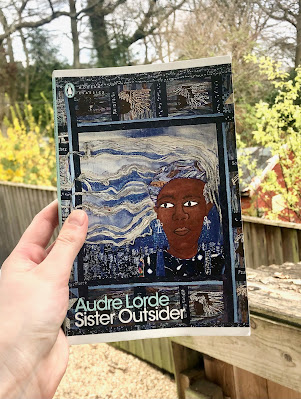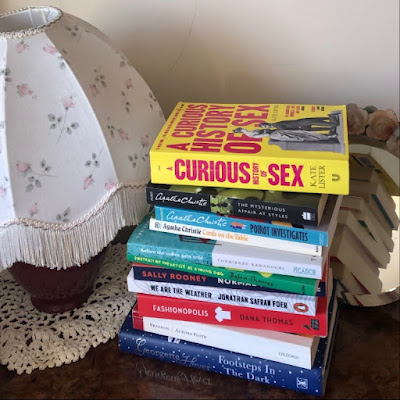2021 for me was definitely the year of incredible non-fiction books. Don’t get me wrong, I read some great fiction too, but it was so so hard trying to decide which titles to include in my top 10 non-fiction this year. I could probably have made a top 20 but who has the time for that. Instead, I thought I’d include my top 10 plus an honourable mentions section – because we all need more incredible books in our lives. All of these are, in my opinion, must reads, just to save me from repeating that over and over again as I discuss each book.
1. Are Prisons Obsolete? By Angela Davis
I’ve read (and listened to) a fair bit by Angela Davis this year and will be making my way through more of her works in 2022 too I’m sure.
If you’re unsure on why prisons (or the police for that matter) are a bad things or kind of get why but couldn’t really articulate it to someone else, this book will help you understand it. Are Prisons Obsolete? breaks down a complex and daunting topic and makes it actually okay to understand. That’s what I love about Angela Davis: that although she is an academic, her writing is accessible and understandable, rather than deliberately vague and elitist in language. She looks at who is most affected by the prison system, the origins of the prison industrial complex, what the prison industrial complex is, how it intersects with other justice issues, how it is upheld culturally and economically globally. A game-changing read.
2. Consumed by Aja Barber
Consumed is the book I was most excited to get this year. And I was not disappointed. Aja has created an incredible and comprehensive guide to consumption’s climate impact and its colonial roots.
There is so much of value in Consumed, from both Aja and the many experts she brings in to comment on the topics the book covers. Some topics are particularly pertinent and need to be discussed, such as the issue of the words ‘poor’ and ‘rich’ and who constitutes each especially in the Global North. Aja focuses on fashion and clothes consumption here but also expands to look at the macro picture of climate justice and how capitalism and colonialism combine forces to create the climate crisis. This would make such a great present for anyone who wants to learn more about sustainability!
3. We Are the Weather by Jonathan Safran Foer
Ugh this book gave me a crisis about the climate crisis. I might have read it too quickly and made that panic and anxiety worse by doing so, but it is quite an addictive read (and I literally had nothing else to do as I was on holiday visiting my grandparents and isolating having been pinged at the time. All I did was read books in the sun, it was great). Be prepared to be slightly overwhelmed with lots of climate facts being thrown at you by this book, especially in the middle. It is intense, I won’t lie to you. But it does get sandwiched between deeply personal narratives that show what is really at the heart of climate justice – personal stories and caring. If I met Jonathan Safran Foer in person we might have a debate about effective solutions (he focuses on just one quite a lot in this book and think that one solution is part of a coalition of many strategies), this book is certainly motivating.
4. Make Bosses Pay: Why We Need Unions by Eve Livingston
Part of the ever-incredible Outspoken series but Pluto Press, this book taught me so much about how unions have been attacked and disempowered in the past century and how they are fighting back in a work environment of increasing casualization and gig-work. She also goes into detail on how union issues intersecting with all other liberation/justice movements that are so urgent right now. Gender, racial, migrant and climate justice are all workers’ issues and workers’ justice is a gender, racial, migrant, and climate issue. They cannot be separated and is one fight - all injustices are so deeply linked.
It left me feeling so fired up and energised in the fight for workers’ rights, as well as better equipped to take a stand against that disempowerment through understanding of its history.
5. We Need to Talk About Money by Otegha Uwagba
This book is a fascinating unpicking of our society’s relationship with money and how that intertwines with other justice issues such as patriarchy and white supremacy. Part memoir, part essay collection, Otegha reflects on her experiences of money growing up attending private school and Oxford as a young Black woman living in a council house, as well as looking back on her early experiences in the workplace before her self-employment. We Need to Talk About Money includes insightful commentary on the Girlboss (and its roots in upper/middle class white supremacy), the commodification of feminism, how we internalise capitalism, and the beauty tax.
6. Sister Outsider by Audre Lorde
This collection of essays is an iconic, if not legendary, work of Black feminist writing. There is so much in there, it is so rich, and so amazingly written. It’s also not a book that can really be read quickly. It’s one that needs to be savoured and taken slowly, read in chunks to be processed properly. I read it for a feminist book club I ran last academic year and I know it’s one I’m going to go over again and again. I learned so much from Audre Lorde in these essays and will continue to learn whatever I can from her I am sure. There’s so much to say about Lorde’s works, there’s no way I can cover everything in a short paragraph. Favourite essays of mine include Poetry is Not a Luxury, The Transformation of Silence Into Language and Action and The Master’s Tools Will Never Dismantle the Master’s House.
7. Loved Clothes Last by Orsola de Castro
This book should be read in combination with Consumed. They genuinely make such a great pairing and feed into each other so well. While some things in this book weren’t new to me (they might be to you!), I did learn a lot about specific fabrics and production practices that was really valuable to my understanding of sustainability in fashion, as well as learning about new DIYs and upcycling ideas to week out the lives of garments we love! It’s full of so much love, hope, and joy for clothes and for the fashion industry, whilst equipping the reader with tools for change.
8. Those Who Can, Teach by Andria Zafirakou
This is potentially my favourite book of the year. I know, that’s a lot to say about a book, but wow it really deserves more hype (I genuinely haven’t seen it talked about outside of one podcast episode where I first heard about it). A combination of memoir, exposé, lesson in teaching, and political manifesto, Zafirakou looks back over her teaching career from her first days leading a classroom to the day she won the Global Teacher of the Year Award, and what her life has been like since. As someone who is also a teacher outside of the formal education system, I found myself relating to many things she was saying as well as learning a whole lot. I finished this book in a day and it left me with so much hope.
9. What White People Can Do Next by Emma Dabiri
This book is one of the most insightful and impactful books I have ever read. I made so many notes and had to take many breaks just to let some of the things I read in it sink in. I also know it is a book I will be re-reading for a very long time to come.
Emma Dabiri goes through the construction of race and whiteness and how capitalism is at the core of racialization and white supremacy. She explains everything in such a comprehensive and concise way, and so many paragraphs and sentences are so impactful I had to keep putting my book down to just think about them for a little bit before continuing reading. Emma also reflects on anti-racist activism in its forms today, especially looking at how it is entwined with capitalism, individualism, and performativity, and how we need to move beyond that to achieve coalition. A must read (especially if you posted a square on Black Out Tuesday and haven’t done much since).
10. A Curious History of Sex by Kate Lister
People who know me in real life know I get really nerdy about sex education and sex history, and just generally facts about sex. It’s so fascinating, and there’s so much that we just aren’t taught in mainstream education. Kate Lister brings us through so many aspects of sex history, from vulvas, penises, sex toys, bicycles, and the creation of Viagra…there are so many fun facts! It’s also one of the funniest books I’ve read this year – Kate’s writing is a joy to read.
There are also so many amazing images which make readng this book in public all the more fun as passersby will likely get ambushed with a close-up image of a Victorian vulva.
Honourable Mentions
I Wish I Knew This Earlier by Toni Tone
Stitched Up: The Anti-Capitalist Book of Fashion by Tansy Hoskins
I’m Afraid of Men by Vivek Shraya
Freedom is a Constant Struggle by Angela Davis
If you like my work and have learned something from it, please consider helping support me (so I have more time to write posts and articles like these!) by buying me a virtual cuppa!
If you liked this post you might like: 25 Ways to Take Climate Action After the IPCC Report
Instagram | Bloglovin' | Pinterest | Twitter











No comments
Post a Comment